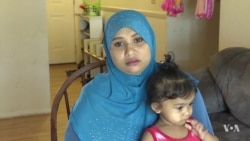For most of his life, Hamidul Hassan says he has struggled to find an identity.
As a Muslim Rohingya living in Myanmar, he had no passport, lacked the freedom to worship his religion, was not free to travel and had no formal education.
He says his only hope for a future was to leave the only country he ever knew.
So, in 2012, he fled to neighboring Bangladesh before reaching Malaysia.
When he eventually arrived off an airplane as a refugee resettling in the United States in 2015, he spoke no English.
Finding a mission in US
But just two years later, Hassan has found his voice … and a mission.
“Except Burmese, I speak five different languages,” he told VOA. “Bengali, Hindi, Malaysia, English and my own language, Rohingya.”
English is a recent addition to his resume but has created exhaustive demand for Hassan’s services in Fort Wayne’s growing Rohingya community.
“Here, nobody translates for the Rohingya, so I am the one,” he said.
Which means day and night, Hassan is essentially on call, traveling around the city to assist about 150 Rohingya families with everything from hospital visits to shopping trips.
He recently quit his job translating for Catholic Charities, the organization helping many Rohingya resettle in Indiana, to take a better paying job in a factory, which means most of his free time now is spent helping others.
“Whenever they need me, they need my assistance,” he explains. “So if I’m already with someone, I can’t give them time, so of course, they need more translators.”
The violent crackdown by military forces on the ethnic Muslim Rohingya population in Myanmar has forced hundreds of thousands to flee across international borders in what officials from the United Nations have categorized as “textbook ethnic cleansing.”
WATCH: Tensions Follow Rohingya Refugees to United States
Refugees
The U.S. State Department’s Refugee Processing Center reports in 2016, those fleeing Myanmar, including many Rohingya, account for the largest number of refugees resettling in the United States, outpacing those fleeing conflicts in Iraq, Afghanistan and Syria.
The unique dialect of the Rohingya has made resettlement and integration somewhat challenging in communities where few speak their language, and has fueled demand for those like Hassan who can help guide them through their new life in America.
Hassan was one of the first Rohingya to resettle in Fort Wayne, and he was hoping to get some help when the rest of his family arrived to join him.
But the arrival of military forces in his village in Myanmar’s Rakhine state changed those plans.
“They fire our house at midnight, so my two brothers and my sister-in-law and their whole family were sleeping at midnight, so they don’t know. So according to my mom, my mom told me before they fire the house, they locked the door from the outside, so they could not get out, and they threw the petrol down the house,” Hassan says.
Family tragedy
Hassan says both of his brothers died in that fire in July.
His mother was shot in the leg as she made her escape from Myanmar to a refugee camp in Bangladesh, where she was treated and now waits to be reunited with the rest of her family, who are scattered around the globe in the wake of continuing violence in Myanmar.
As he racks up the miles on his used car traveling around the city of Fort Wayne, the heart-breaking stories Hassan hears from those he helps are strikingly similar to what his own family faced.
He says it reinforces to him the importance of his role in helping fellow Rohingya refugees find stability, and hopes more can find peace alongside him and the other Burmese of many different religious and ethnic backgrounds who have all sought refuge in Fort Wayne.
“Whatever went wrong in Burma is not going to happen in this country, because we are all refugees,” he emphasized during his interview with VOA. “We have to live here together.”
Together in a community now made up of more than 6,000 refugees from Myanmar, making Fort Wayne one of the largest Burmese communities in the United States.















